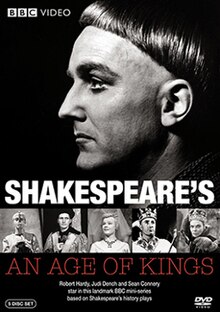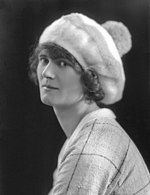Introduction
The concept for the series originated in 1959 with Peter Dews, a veteran BBC producer and director, who was inspired by a 1951 Anthony Quayle-directed production of the Henriad at the Theatre Royal and a 1953 Douglas Seale-directed repertory cast production of the three parts of Henry VI at the Birmingham Repertory Theatre and subsequently, The Old Vic. [1] At the time, An Age of Kings was the most conceptually ambitious Shakespeare project ever undertaken, containing over 600 speaking roles, and requiring thirty weeks of rehearsal prior to performance. Each episode cost roughly £4,000. Adapter Eric Crozier cut the text of the eight plays into sixty-, seventy-, seventy-five- and eighty-minute episodes, with each episode roughly corresponding to half of each play. The only exception to this was 1 Henry VI, which was reduced to a single hour-long episode. [2]
Dews sourced most of his cast from The Old Vic, using many of the same actors who had appeared in Seale's production, although in different roles (Paul Daneman for example, played Henry VI for Seale, but played Richard III in Age of Kings). Dews also used actors with whom he had worked while directing undergraduate plays at Oxford University. He gave the job of directing to his assistant, Michael Hayes. [2] The initial plan was for the series to be the inaugural production in the BBC's newly built BBC Television Centre in London, but when the studios opened, the series was not ready, and was instead broadcast from the Riverside Studios in Hammersmith. [2] Peter Dews described the set as "a large permanent structure; platforms, steps, corridors, pillars, and gardens, which will house nearly all the plays' action and which will, despite its outward realism, be not very far from Shakespeare's "unworthy scaffold"." [3] The entire production was shot with four cameras running at any given time. For battle scenes, a cyclorama was used as a backdrop, obscured with smoke. Almost the entire series was shot in medium and close-ups. All fifteen episodes were broadcast live, [4] though a "telerecording" of the series was also made. [1]
Many of the episodes ended with wordless pseudo-teasers for the following episode. For example, "The Deposing of the King" ends with a shot of Northumberland's dagger stabbed into Henry IV's paperwork, visually alluding to his later rebellion. "Signs of War" ends with a shot of a signpost reading "Agincourt", alluding to the upcoming battle in the following episode. "The Sun in Splendour" ends with George, Duke of Clarence almost falling into a vat of wine, only to be saved by his brother, Richard, who looks deviously at the camera and smiles, alluding to his subsequent murder. "The Dangerous Brother" ends with Richard watching the sleeping Princes in the Tower before smiling to himself and then blowing out a candle, again alluding to his planned murder. Head of BBC drama Michael Barry referred to these "teasers" by explaining that "a strengthened purpose is added to the narrative when it is wholly seen, and we are able to look forward to 'what happens next'." [5]
The series was a great success, with an average viewing audience of three million in the UK. The Times hailed the production as "monumental; a landmark in the BBC's Shakespearian tradition." [6] The series won the British Guild of Directors' award for "Excellence in Directing" and the Peabody Award in the US. [7] It led to a follow-up, The Spread of the Eagle , consisting of Shakespeare's Roman plays which did not prove as successful. [8]
United States airing
After a run on the New York City independent commercial station WNEW beginning on 10 January 1961, the series was acquired for the United States public television network National Educational Television (NET) by the National Educational Television and Radio Center (NETRC), with financial support from the Humble Oil and Refining Company (the show was the first nationally distributed non-commercial series to receive support from a commercial source). [9] Costing $250,000, Humble Oil not only paid for the national rights but also for all publicity. NETRC promoted the show based on its educational value rather than its entertainment value, referring to it as "an experience in historical and cultural understanding," and stating "insofar as we are able, cultural phenomena peculiar to the time and environment will be [...] explained, and significant themes will be explored wherever appropriate." Shakespeare scholar and Emmy Award-winning Frank Baxter of the University of Southern California provided commentary on the "historical, geographical and genealogical backgrounds of the plays." [9] First airing on 20 October 1961, on the 60 non-commercial TV stations then on the air, it proved a hit with both audiences and critics; the New York Herald Tribune called it "easily one of the most magnificent efforts of the TV season"; The New York Times wrote, "whatever may be said of their ethics, those noblemen make for superb entertainment." [9] As public television's first smash hit, the series led to many other successful British drama imports. [9]
Other countries
The series was also shown in several other countries, typically to a positive response. For example, in Australia, it was broadcast on ABC from October 1961, and was met with positive reviews. [10] In Canada the series started October 1963. [11] [12] In West Germany, it was shown on WDR in 1967–1968. [13] In the Netherlands, it was shown on NCRV from January 1966, again meeting with good reviews. [14] [15]








